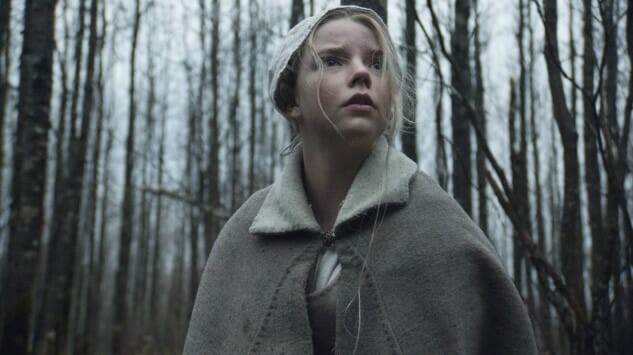The Best Horror Movie of 2016: The Witch

This post is part of Paste’s Century of Terror project, a countdown of the 100 best horror films of the last 100 years, culminating on Halloween. You can see the full list in the master document, which will collect each year’s individual film entry as it is posted.
The Year
This is, without a doubt, one of the deepest years of the decade for the horror genre, with a nigh-overwhelming number of quality films to choose from. Not only that, but there’s a great amount of variety to these features, with a notable influx of international titles to boot. Everything from big-budget studio horror (The Conjuring 2, Ouija: Origin of Evil), to arthouse weirdness (The Witch), Netflix originals (Hush) and top-flight horror anthologies (Southbound) are present in the mix.
An immediate favorite and often overlooked selection is The Invitation, a taut, slow-burn thriller that will fray your nerves as it worms its way under your skin. Karyn Kusama shows an impressive grasp of cinematic suspense in this story, set at a dinner party, in which a grieving man slowly comes to suspect that the host (his ex-wife) has something sinister planned for her guests. This is one of those horror films that satirizes modern relationships as we operate within the bounds of “polite” society, with the result being that our protagonist often comes into conflict not with life-or-death struggles (at least not at first), but the hurdles created by tact and civility, even as he knows, deep down, that something is amiss. It creates an intense sensation of awkwardness that borders on horrific all on its own, only amplified by the arrival of some unexpected guests to the situation. Praise is deserved by veteran character actor John Carroll Lynch once again, who brings the same incredible, cerebral menace to his character that we previously saw in David Fincher’s Zodiac. Truly, this guy is one of the genre’s best and least-heralded performers.
This is also a very strong year for horror in South Korea, which contributes both the dread-inducing supernatural vibes of The Wailing and the phenomenally successful zombie film Train to Busan, which innovated not via style but setting, putting almost all of its action on a series of trains filled with the undead. Although derided by detractors as aping the train setting of 2013’s Snowpiercer, it’s easy to look past the basic similarities when Train to Busan is filled with such likable characters and satisfying action. Progressing like a videogame from car to car, but simultaneously ripe with pathos thanks to a few parallel storylines, the film features a handful of sights that had never been seen in the zombie genre to date, including a human chain of zombies, 50 deep, being dragged behind a moving train. It also can lay claim to one of the most genuinely aggravating asshole characters to ever factor into a zombie movie—a guy who is so terrible that you are desperate to see him finally get some comeuppance.
Strong performances also abound in the likes of 10 Cloverfield Lane, which would have been a well-earned Oscar nomination for John Goodman if it wasn’t too close to the horror genre for voters’ tastes, and The Autopsy of Jane Doe, which benefits from an engaged Emile Hirsch and Brian Cox at his salty best. And then there’s the pulse-raising, claustrophobic cat-and-mouse game of Don’t Breathe, in which a team of thieves invade the house of a particularly dangerous blind man and get far more than they bargained for. Truly, 2016 was a bumper crop—there’s no shortage of films here that every horror fan should check out.
2016 Honorable Mentions: The Invitation, Don’t Breathe, Train to Busan, 10 Cloverfield Lane, The Wailing, The Autopsy of Jane Doe, Green Room, Southbound, Under the Shadow, Hush, The Conjuring 2, Ouija: Origin of Evil, The Shallows, The Girl With All the Gifts
-

-

-

-

-

-

-

-

-

-

-

-

-

-

-

-

-

-

-

-

-

-

-

-

-

-

-

-

-

-

-

-

-

-

-

-

-

-

-

-








































